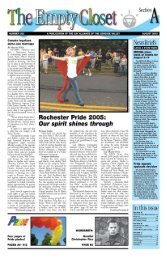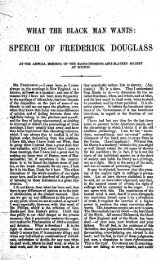Download PDF - University of Rochester Libraries
Download PDF - University of Rochester Libraries
Download PDF - University of Rochester Libraries
Create successful ePaper yourself
Turn your PDF publications into a flip-book with our unique Google optimized e-Paper software.
TEACHERS IN THE MARKETPLACE<br />
$70 increase in buying power over 1930. By contrast, the<br />
average American is expected to have $127 more buying <br />
power at the end <strong>of</strong> the same period.<br />
In this respect, Pr<strong>of</strong>essor Harris notes, doubling faculty<br />
salaries is a modest program. "But in another sense," he<br />
says, "the proposed rise seems large indeed. None <strong>of</strong> the<br />
authorities ... has told us where the money is coming<br />
from." It seems quite clear that a fundamental change in<br />
public attitudes toward faculty salaries will be necessary<br />
before significant progress can be made.<br />
FINDING THE MONEY is a problem with which each<br />
college must wrestle today without cease.<br />
. . For some, it is a matter <strong>of</strong> convincing taxpayers<br />
and state legislators that appropriating money for faculty<br />
salaries is even more important than appropriating<br />
money for campus buildings. (Curiously, buildings are<br />
usually easier to "sell" than pay raises, despite the seemingly<br />
obvious fact that no one was ever educated by a pile<br />
<strong>of</strong> bricks.)<br />
For others, it has been a matter <strong>of</strong> fund-raising campaigns<br />
("We are writing salary increases into our 1959-60<br />
budget, even though we don't have any idea where the<br />
money is coming from," says the president <strong>of</strong> a privately<br />
supported college in the Mid-Atlantic region); <strong>of</strong> finding<br />
additional salary money in budgets that are already<br />
spread thin ("We're cutting . back our library'S book<br />
budget again, to gain some funds in the salary accounts");<br />
<strong>of</strong> tuition increases (' 'This is about the only private enterprise<br />
in the country which gladly subsidizes its customers;<br />
maybe we're crazy"); <strong>of</strong> promoting research contracts<br />
("We claim to be a privately supported university, but<br />
what would we do without the AEC?"); and <strong>of</strong> bargaining.<br />
"The tendency to bargain, on the part <strong>of</strong> both the colleges<br />
and the teachers, is a deplorable development," says<br />
the dean <strong>of</strong> a university in the South. But it is a growing<br />
practice. As a result, inequities have developed: the<br />
teacher in a field in which people are in short supply or in<br />
industrial demand-or the teacher who' is adept at<br />
"campus politics"-is likely to fare better than his colleagues<br />
who are less favorably situated.<br />
"Before you check with the administration on the<br />
actual appointment <strong>of</strong> a specific individual," says a<br />
faculty man quoted in the recent and revealing book, The<br />
Academic Marketplace, "you can be honest and say to<br />
the man, 'Would you be interested in coming at this<br />
amount?' and he says, 'No, but I would be interested at<br />
this amount.'" One result <strong>of</strong> such bargaining has been<br />
that newly hired faculty members <strong>of</strong>ten make more<br />
money than was paid to the people they replace-a happy<br />
circumstance for the newcomers, but not likely to raise<br />
the morale <strong>of</strong> others on the faculty.<br />
"We have been compelled to set the beginning salary<br />
<strong>of</strong> such personnel as physics pr<strong>of</strong>essors at least $1,500<br />
higher than salaries in such fields as history, art, physical<br />
education, and English," wrote the dean <strong>of</strong> faculty in a<br />
state college in the Rocky Mountain area, in response to a<br />
recent government questionnaire dealing with salary practices.<br />
"This began about 1954 and has worked until the<br />
present year, when the differential perhaps may be increased<br />
even more."<br />
Bargaining is not new in Academe (Thorstein Veblen<br />
referred to it in The Higher Learning, which he wrote in
















